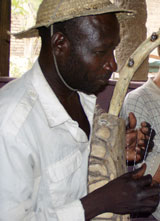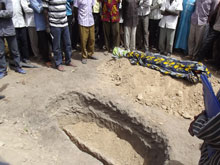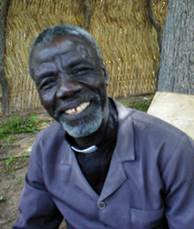
[Home] [Archived news updates and letters]
|
News from Mark and Diane
Vanderkooi April 16, 2015 |
|
|
The
rhythmic throb of drums punctuated the wailing, and a cloud of dust
spiraled out the open tomb, up over the crowd into a blazing, cloudless
sky as young men shoveled the dry dirt onto the corpse. Chikina, was
being laid to rest after succumbing to something – you seldom really
know what – though in this case it might have been cancer or maybe
tuberculosis if his skeletal state 24 hours earlier was anything to go
by. As it happens, those 24 hours were the most important of his
modest life, which was otherwise distinguished by his skill in the
fabrication of the five-string harps which are the signature instrument
of Kwong music. Except insofar as we were in need of a harp (rarely), he
was little more than an acquaintance to us. So it came as a surprise
when Kaglo, one of our radio announcers, a dear friend, and a relative
of Chikina accosted Mark on the path yesterday and asked him to go see
Chikina, perhaps in the vain (though common) belief that there might
still be something the white missionary could do to save him. It
was a sad sight to behold. One could count every bone of his body under
the thin skin stretched over his almost comatose form. Deathbed conversions have a well-earned reputation of being
just a little too convenient, but then again, as someone once said,
there is nothing like impending death to focus the mind. Kaglo and Mark
judged they had nothing to lose if they spoke – and Chikina had much
to lose if they kept silent. They laid out the notions of atonement and
reconciliation to God to the apparently uncomprehending form lying
before them on a mat under a grass shelter. When they finished,
the form spoke – for a very long time in a barely audible, rasping
voice. Yes, he was ready. As he lay there, he made his appeal to
God in the name of Jesus, again for a very long time, and then Kaglo
(who with his typically Kwong bionic hearing actually understood what
Chikina had said) responded with his own appropriate prayer. Exactly 24
hours later, the dust billowed from his grave. But it was not the thought of Chikina’s death which kept us
awake at night. As Chikina’s body was failing him, we greatly feared
the death of the man who remains arguably our dearest friend and
confident in Kwongland, Pastor Moses Wanang, also affectionately
known in Mark’s older newsletters as “Old Moses.” In the
end, it looks like his tale will have a happier ending (at least from a
human standpoint) than that of Chikina, thanks in no small measure to
the graciousness of the Adventist pilot who dropped everything to
evacuate him, and to the timely treatment and blood transfusions given
by the doctors at the Adventist hospital. Life and death here has none of the sterility, none of
professionalism, none of the decorum which blesses it – and perhaps
curses it – at home. It is earthy, ubiquitous, and often filled with a
pathos which westerners can scarcely comprehend – exemplified in
today’s events by Chikina’s son who sat alone, weeping
uncontrollably as they buried his father, completely ignored by 300
bystanders whose presence was ostensibly to comfort the bereaved. While
we don’t enjoy the tension, the sleepless nights, and the frequent
sense of helplessness, we would not, given a choice, trade them for a
more domesticated life (though it would be a tempting proposition
nevertheless). For by them, the real realities of the universe are
constantly thrust before our eyes, and we are, it seems (or at least we
hope), much the richer in our souls because of it. |
Chikina
in life
Chikina
in death
Pastor
Wanang |
|
|
|


